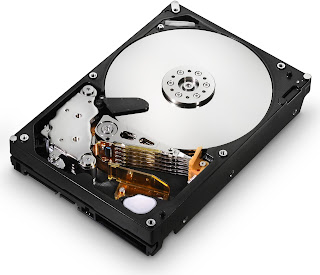What Is SSD and HDD & How Do They Differ
Solid State Drive or
SSD is a non-volatile storage device that locks in continuous data using solid
state flash memory. (NAND ) It isn’t your
usual traditional hard drive. There are no moving parts that make it work. It
has a wide arrangement of semiiconductor memory that has been systematized as a
disk drive, using Integrated Circuits ( IC’s ). It is known as non-volatile
because it retains your data when the computer is closed. SSD uses a controller and it is known as the
processor. The processor is ingrained in to the system and it is known as the
brain of the computer. The processor determines the speed of the SSD. There are
a lot of high speed processors out there. One example is the Intel I7 Quadcore
2.9 4.2 GHz turbo boost with 8MB of cache. There are so many like it in the
market. AMD also has it’s own version of speedy processors. The connector used
for the SSD is what we call SATA (
Serial Advanced Technology Attachment ). It is a computer bus interface that
connects ATA hard drives, Solid State Drives
and Optical drives to the computer
motherboard.
There are different qualities that define SSD's and HDD's
1. Power/Battery: SSD-needs less power to oiperate ( 2-3 watts ). HDD- needs more power to
operate ( 6-7 watts ).
2. Price: SSD- expensive $0.20//GB ( 1TB ). HDD-cheap $0.03/GB ( 4TB ).
3. Capacity: SSD-maximum of 1TB for laptop; 4TB for Desktop. HDD maximum2TB for laptop
and 10TB for desktop.
4. Time For OS To Boot: SSD-10-13 seconds ( average ). HDD-30-40 seconds ( average ).
5. Vibration: SSD-none. There are no moving parts. HDD-spinning parts can make computers
vibrate.
6. Heat: SSD-less power with no moving parts produces little heat. HDD-does not heat up but the
amount is more than of the SSD because of the moving parts and more power to operate.
7. File Copy and Write Speed: SSD-normally above 200MB/s up to 550MB/s. HDD-anywhere
within 50MB/s-120MB/s.
8. Encryption: SSD-Full Disk Encrption ( FDE ). Some models support FDE. HDD-Full Disk
Encryption and some models support FDE.
9. File Opening Speed: SSD-25% to 30% faster than HDD. HDD-slower than SSD.
10 Magnetism Effect: SSD-not affected by magnetism. HDD-magnets can wipe out data.
Hard Disk Drive or
HDD is a non-volatile computer storage device that is composed of magnetic
disks or platters that continually spin around at high speed. This acts as a
second storage with the random access memory ( RAM ) being the first storage.
HDD is more popularly known as Hard Drive. It is also non-volatlile ( same as
the SSD ). The HDD’s have been here for quite long a long time now. ( over 60 years
). IBM was the first to use it in 1956. It’s really a very old technology. It relies
on magnetism locked in your data on a
platter that rotates. The faster the platter goes around, the faster the HDD’s
performance will be. The normal laptop drives spins for about 5400 RPM
(
Revolutions Per Minute ) up to 7200 RPM. If it is server based then it can
reach up to 15,000 RPM. The advantage that it has is that it can store a lot of
data. The price of the HDD is inexpensive when compared to the price of an SSD.
When buying
computers, users must know what they need.
You buy a laptop or desktop based on the things that you do. If you are
in to business, there are laptops and desktops that are readily available for
you. This also holds true for those that
have a creative mind. Do not buy because of instinct. Think before you decide.This write-up is just a guide.





0 Comments:
Post a Comment
Subscribe to Post Comments [Atom]
<< Home